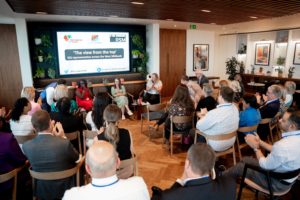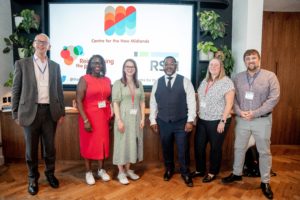
If you missed our ‘View from the Top’ event (held in partnership with RSM UK), here’s a recap of the conversations that we facilitated at 103 Colmore Row on 21st June 2023.
Nichola Claessen (Consultant in Environmental, Social, and Governance (ESG) at RSM UK) shares some of the evening’s key discussions, which included an overview of Dr Karl George’s RACE Equality Code as well as insights into the Race Equalities Taskforce, chaired by Yetunde Dania (one of our panellists and Head of Office, Trowers & Hamlins).
‘View from the Top’ saw business leaders and professionals from across the West Midlands unite to talk about the importance of addressing racial disparities. After enjoying some nibbles and the view from the top of Eighteen at 103 Colmore Row, attendees gathered to hear from the esteemed panel of prolific leaders from the region: Yetunde Dania, Partner and Head of Office at Trowers & Hamlins, and Chair of the West Midlands Combined Authority Race Equalities Taskforce; Henrietta Brealey, Chief Executive at the Greater Birmingham Chambers of Commerce; and Alison Smith, Diversity and Inclusion Lead at Severn Trent Water.
The panel event was opened and chaired by Karl George, Partner and Head of Governance at RSM UK and author of the RACE Equality Code, who set the tone for the evening by introducing his DRIVERS framework for embedding race equity in leadership and organisational culture through a cleverly devised icebreaker.
The DRIVERS
Karl’s framework is as follows:
D – Diversity, and targeted universalism
Targeted universalism focuses on one area or protected characteristic, such as race, where lessons learned benefit every group. Karl shared candid anecdotes of attending partners’ conferences in his 20s, ‘putting on a mask’ and ‘code switching’ to feel a sense of belonging. However, we now need to be supporting everyone to be their authentic themselves, with a sense of belonging and an appreciation for how uniqueness adds value in business and wider society.
R – Responsibility, and the deficit model
Karl challenged the deficit model and talked about the importance of understanding that it is not the underrepresented individual’s responsibility to fill ‘deficits’ in their skills or experience that exist because of systemic discrimination. Rather, it is an organisation’s responsibility to ensure everyone can develop and progress within a supportive environment that acknowledges lived experience.
I – Integrity, and avoiding ‘black washing’
Like ‘green washing’ that can be seen when organisations make unsubstantiated claims around the sustainability of their operations or products, EDI commitments without action and accountability run the risk of ‘black washing’ with no consequences for poor performance. Bold claims should be supported by a robust accountability framework, such as that which the RACE Equality Code was created to foster.
V – Values, and being anti-racist
Karl discussed the fundamental distinction between non-racist and anti-racist. The former implies a complacent and complicit position that can, sometimes unwittingly, contribute to disparities through lack of action. In contrast, anti-racism involves taking proactive steps to address barriers and tackle racism – the resurgence of the Black Lives Matter movement in 2020 highlighted how crucial proactivity is in addressing racial inequity.
E – Equity, and ‘square pegs’ and ‘round holes’
The ‘square pegs’ and ‘round holes’ analogy highlights the distinction between equality and equity, by recognising that if not all people start from the same place, treating everyone equally is inherently not the fairest solution. Instead, we can stop expecting ‘square pegs’ to fit into ‘round holes’ and embrace difference.
R – Reality, and the ‘grey rhino’
The consequences of racial inequity can often be a ‘grey rhino’ risk for organisations in that racial inequity is highly probable, is highly impactful and yet is all too often neglected. Having difficult conversations now and addressing the grey rhino in the room will pay long term dividends for organisations, and society as whole.
S – Society, and allyship
Karl quoted John Mbiti: ‘I am because we are; we are therefore I am.’ Mbiti’s thought-provoking twist on Descartes’ ‘I think, therefore I am’ captures the importance of community. Coming together to tackle injustice and work towards inclusion and belonging for all is integral for making a change.



Building on the themes outlined in Karl’s DRIVERS framework, panellists were invited to reflect on how their own organisations were addressing racial disparities. Yetunde, Henrietta, and Alison shared examples of initiatives and best practice they have implemented within their respective organisations.
Do targets lead to tokenism?
It’s no secret that setting quotas or targets to achieve increased diversity and representation is a controversial topic. Karl invited the panel to reflect on whether setting targets can lead to real or perceived tokenism, whereby the progression of individuals from underrepresented groups is seen to be based on ‘ticking a box’ as opposed to meritocracy.
Henrietta commented that ‘targets are like hammers’ that can ‘build a house’ of diversity and inclusivity, or ‘break a window’ and lead to tokenism. She described how leaders are responsible for using targets appropriately, with a curiosity to uncover why underrepresentation occurs. In digging deeper to uncover root causes behind the data that informs targets, organisations can take meaningful action and improve performance. Henrietta described how her organisation’s RACE Equality Code Assessment journey helped her realise the importance of setting meaningful targets.
Alison agreed, adding she loves data for its ability to start conversations and encourage leaders ask questions. As an example, she described how Severn Trent Water targets schools in less advantaged areas to inspire a more diverse talent pipeline and noted that such initiatives had promising conversion rates for students and interns becoming employees.
Yetunde emphasised the crucial role that culture plays alongside targets. ‘It is easy to hit targets’ through recruiting diverse candidates; the real challenge lies in ensuring that an organisation’s culture is conducive to retaining diverse talent and avoiding tokenism.
The level of engagement from attendees was excellent throughout the event, with panellists open to discussing difficult questions. One particularly poignant question touched on how organisations can be educated on why ‘we need to be unfair to be fair’ through embedding equity as opposed to equality.
Alison highlighted the need to educate decision makers, and to acknowledge that everyone is different but not every difference is equal. Therefore, positive action is sometimes necessary. She also agreed that if you make change in one area, it can lead to benefits for everyone such as accessible equipment being easier to use for all employees, as an example of targeted universalism.
Henrietta noted that her organisation is looking at how people are interviewed in terms of tone and specificity to be more inclusive for autistic candidates, and that all applicants have benefitted from improved interview practices as a result.
Yetunde echoed the benefits of looking at recruitment and described her firm’s approach of contextualised recruitment, where less advantaged candidates receive markers or credits to level the playing field, and how this has improved the quality of the intakes. The outcomes have challenged the idea that positive action leads to ‘dumbing down’; changing requirements doesn’t have to change the quality of candidates.
A number of key themes emerged: namely the importance of building a psychological safe culture where people can put their hands up and say, ‘I don’t know’ and be educated; the shared benefits of inclusivity and accessibility for all; the profound impact of engaging with the community as a whole; and seeking to find not only barriers but solutions.
One thing was clear: there is more work to be done. However, the panel event carried an air of inspiration and optimism that a more united approach will turn the dial on racial equity.
Images of the event are available by visiting our photo gallery
ABOUT OUR AUTHOR:
Nichola Claessen is a Consultant in Environmental, Social, and Governance (ESG) at RSM UK. Nichola helps RSM’s clients to develop and mature their ESG strategies and performance, as well as their overall management of ESG-related risks and opportunities using our maturity framework and materiality assessment methodology. Data analysis is a crucial element of her work. She has supported SMEs and large businesses in industries such as manufacturing, transport, marketing, healthcare, membership organisations, and social housing.
She helps clients find bespoke solutions, because she believes ESG empowers all sectors to work towards common goals. Nichola considers consolidating different stakeholders’ priorities and drivers to be key. She assists clients in identifying the exciting opportunities that ESG presents to build resilience, for example, through securing funding and strengthening reputation and consumer loyalty.
Outside of work, Nichola enjoys making music, spending time with family and friends, and finding new vegan junk food to try. She also enjoys meditation, listening to podcasts, and finding opportunities to keep learning.
